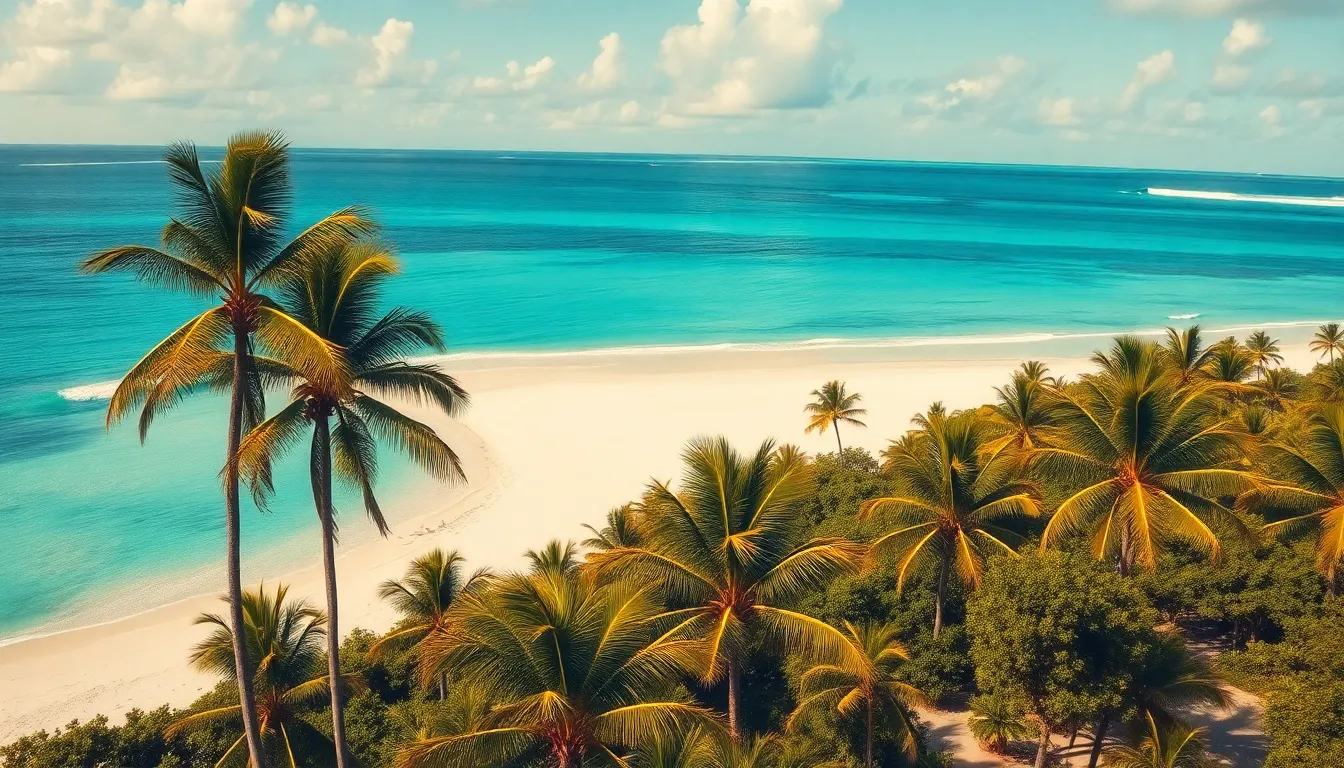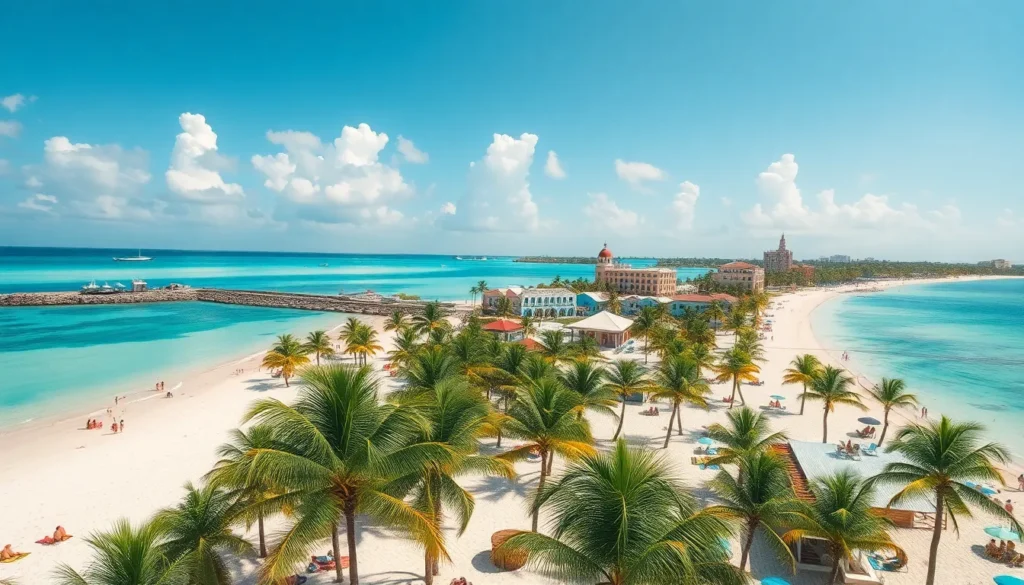The Bahamas, with its stunning beaches and vibrant culture, often sparks curiosity about its political ties. Is this tropical paradise part of the United States? While many dream of sipping cocktails in the sun, they might get tangled in the web of geography and politics. Spoiler alert: it’s not!
Overview of The Bahamas
The Bahamas consists of roughly 700 islands and over 2,400 cays, creating a diverse landscape. Each island offers unique scenery, from the vibrant coral reefs of the Exumas to the bustling streets of Nassau. The capital, Nassau, located on New Providence Island, serves as the cultural and economic hub of the nation.
Tourism plays a pivotal role in the Bahamian economy. In 2019, visitors totaled approximately 7.2 million, contributing significantly to local businesses. Attractions such as the Blue Hole, swimming pigs, and luxury resorts draw travelers worldwide.
The official language in the Bahamas is English, reflecting its colonial history. Bahamians embrace a rich cultural heritage influenced by African, European, and indigenous traditions. Music genres such as Junkanoo and calypso resonate throughout the islands, showcasing the vibrant spirit of its people.
Furthermore, the Bahamas boasts a subtropical climate, featuring warm temperatures year-round. This pleasant weather makes it an ideal destination for outdoor activities like snorkeling, diving, and sailing. From white sandy beaches to lush landscapes, natural beauty is abundant.
Each island presents distinct experiences for visitors. Family-friendly attractions exist alongside secluded retreats, catering to various preferences. Travelers can immerse themselves in local cuisine, known for dishes like conch fritters and rock lobster.
Understanding its status is crucial for those seeking to explore the Bahamas. Although geographically close to the United States, the country maintains full sovereignty and operates independently. This independence shapes its political and economic landscape while enriching its cultural identity.
Historical Context

The historical background of the Bahamas offers insight into its distinct identity. This context highlights its colonial history and path to independence.
Colonial History
European explorers first arrived in the Bahamas in the early 15th century. Spain claimed the islands, though they did not settle extensively. By the late 1600s, the British began establishing colonies. Notably, they took control in 1718 and maintained governance for over two centuries. During this period, the Bahamas became an important site for the transatlantic slave trade, shaping its demographic and cultural landscape. Diverse influences from African, European, and indigenous populations emerged. The British legacy remains evident today, particularly through the English language and legal systems.
Independence and Sovereignty
The push for independence gained momentum after World War II. Political changes in the 1950s and 1960s set the stage for self-governance. On July 10, 1973, the Bahamas officially gained independence from British rule. This milestone marked a significant moment for national identity and pride. The country operates as a sovereign nation with its own constitution. It manages domestic and foreign policies independently, reinforcing its status on the global stage. Full sovereignty allows the Bahamas to maintain cultural traditions while fostering global connections, particularly in tourism and trade.
Geographic Location
The Bahamas is located in the Atlantic Ocean, southeast of the United States. Comprised of around 700 islands, it lies just 50 miles from Florida’s coast. This proximity makes it a popular getaway for American tourists seeking sun and adventure. The islands provide diverse landscapes, from serene beaches to vibrant cities like Nassau.
Proximity to The United States
Being close to the U.S. enhances the Bahamas’ appeal. Bimini, one of the closest islands, sits only 50 miles from Miami. Short flights and ferry rides make travel convenient for American visitors. This nearness fuels a significant tourism industry. The Bahamas attracts millions of visitors each year, adding to its economic vitality.
Political Status
The Bahamas operates as an independent nation, distinct from the United States. Gaining independence from British rule on July 10, 1973, established its sovereignty. The country maintains its own government and legal system. Understanding this political status is important for tourists. The Bahamas is not a U.S. territory, ensuring unique cultural experiences and customs.
Cultural and Economic Relations
Cultural and economic ties between the Bahamas and the United States influence both nations. Frequent exchanges occur through tourism and trade.
Tourism and Trade
Tourism represents a cornerstone of the Bahamian economy. Approximately 7.2 million visitors traveled to the Bahamas in 2019, with many hailing from the U.S. Travelers are drawn to the islands’ unique attractions, such as luxury resorts and natural wonders. Trade plays a significant role too. The Bahamas imports a substantial amount of goods from the U.S., including food and machinery, to sustain its economy. Local businesses benefit from these interactions, enhancing product availability and consumer choices.
Immigration Patterns
Immigration patterns reveal a strong connection between the two nations. Many Bahamians relocate to the U.S. for education and employment opportunities. In 2021, around 70,000 Bahamians resided in the U.S., contributing to various sectors like healthcare and hospitality. U.S. immigration policies directly affect these patterns, influencing the flow of people. Despite the challenges, cultural exchanges continue to strengthen the bond between the Bahamas and the United States, fostering a blend of traditions and lifestyles.
The Bahamas stands as a vibrant and independent nation with a rich cultural heritage and stunning natural beauty. Its close proximity to the United States fosters a unique relationship characterized by tourism and trade. While many Americans are drawn to its idyllic landscapes and warm climate, it’s essential to recognize the Bahamas’ sovereignty and distinct identity. As travelers explore its islands, they engage with a culture shaped by history and diversity, making each visit a unique experience. Understanding this distinction enhances the appreciation for what the Bahamas has to offer beyond its allure as a tropical getaway.





